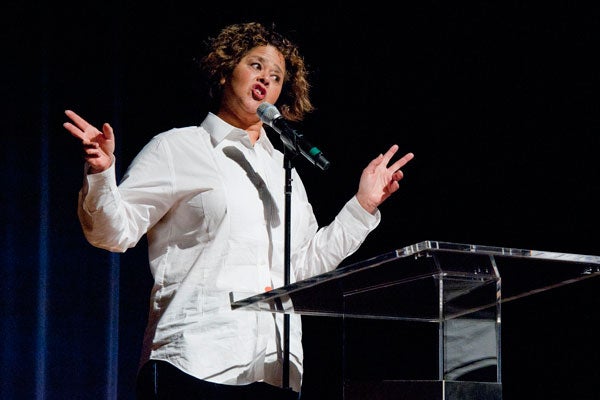|
May 4, 2012
Actress and author Anna Deavere Smith brings 'grace' to Stanford
Through a series of moving monologues, Anna Deavere Smith demonstrates the many manifestations of 'grace' at the Heyns Lecture on Religion and Society. By Camille Brown

Anna Deavere Smith spoke to a capacity crowd at Stanford's Cubberley Auditorium. (Photo: Linda A. Cicero / Stanford News Service) Anna Deavere Smith doesn't just talk about grace; she embodies it. During Tuesday's sold-out lecture at Stanford's Cubberley Auditorium, Smith captivated the crowd with a series of first-person monologues that demonstrated how, when we open our eyes, acts of grace are all around us.
Sponsored by the Office for Religious Life, the Heyns Lecture on Religion and Society is an annual event that features a major speaker focusing on problems and challenges of religion and community. Smith's exploration delved into the multi-faceted definition of grace, with impressions of religious figures, including an imam and a Buddhist monk, as well as secular personalities.
Fresh from an artist-in-residency position with Grace Cathedral in San Francisco, Smith drew from her theatrical and academic background to give voice to a variety of people exemplifying the forgiveness, love and selfless action that characterize our popular conception of grace.
Over the years, Smith has interviewed people from all walks of life about issues like social justice and, more recently, grace. By transforming the transcripts of those interviews into moving first-person accounts, Smith has pioneered a new form of performance.
Approaching the topic of grace with the combined expertise of a playwright, an actor and a professor, Smith chooses to focus not just on the definition of grace within church literature but rather its manifestations in the "narrative of human dignity."
Opening with the simple statement "When you say a word, it becomes you," Smith went on to describe the creative process she uses to capture the seemingly ephemeral moments of grace. With the raw material collected from interviews, she crafts monologues that reflect not just what the interviewee said but the subtext as well.
After briefly discussing her own spiritual philosophies, Smith segued into the first solo performance of the evening, a monologue in the voice of the late Rev. Peter Gomes, pastor of Memorial Church at Harvard University. Using a pronounced New England accent and affected gestures, Smith launched into the history of the hymn "Amazing Grace."
Smith examined acts of forgiveness and selflessness through the eyes of seven characters. Taking on the voice of Imam Feisal Rauf, Smith noted that "language is a grid through which we see reality. If we don't have a word, we don't see it. Christians use the word 'grace' as a special human intervention by God into human affairs that has a powerful phenomenon from it."
She went on to compare this to the call to prayer in Islam: "The fact that the call to prayer has such a compelling power to anyone that hears it is an act of grace."
Smith also investigated the definition of grace from a secular point of view by portraying the famous Bay Area chef Alice Waters. Smith demonstrated how Waters' quiet manner and delicate fleeting hand motions, both in conversation and in food preparation, conjure sentiments of grace.
As Waters, Smith noted grace "is to give something without expecting anything in return. … Whatever you have, you want to share!"
Last, in a completely different vein, Smith told a story of grace that emerged from the 1992 Los Angeles riots sparked by the police beating of motorist Rodney King. Maria was one of the jurors faced with determining the fate of four police officers accused of brutal acts of violence. In relaying Maria's courtroom recollections, Smith animatedly described the jurors confessing to feelings of guilt and stress and how their personal exoneration led to a graceful delivery of the verdict.
In a brief question-and-answer session after the lecture, the Rev. Joanne Sanders, associate dean for religious life, told Smith her presence was "richly and fully grace itself."
Added the Rev. Scotty McLennan, dean for religious life: "To have [Smith] come and connect the world of drama to what's happening in society at large and to do that with the topic of grace was … the ideal connection of religion and society through this medium of drama that she's so adept in."
When asked what aspect of grace she hoped Stanford students would take away from her talk, Smith responded with hope.
"I want to encourage Stanford students," she said, "to realize that with any kind of a crisis or trouble or a lack, people really begin to say and make up extraordinary stories and narratives that allow them to restore human dignity and bring meaning to the world."
Camille Brown is an intern with the Human Experience, the Humanities web portal for Stanford University.
-30-
|